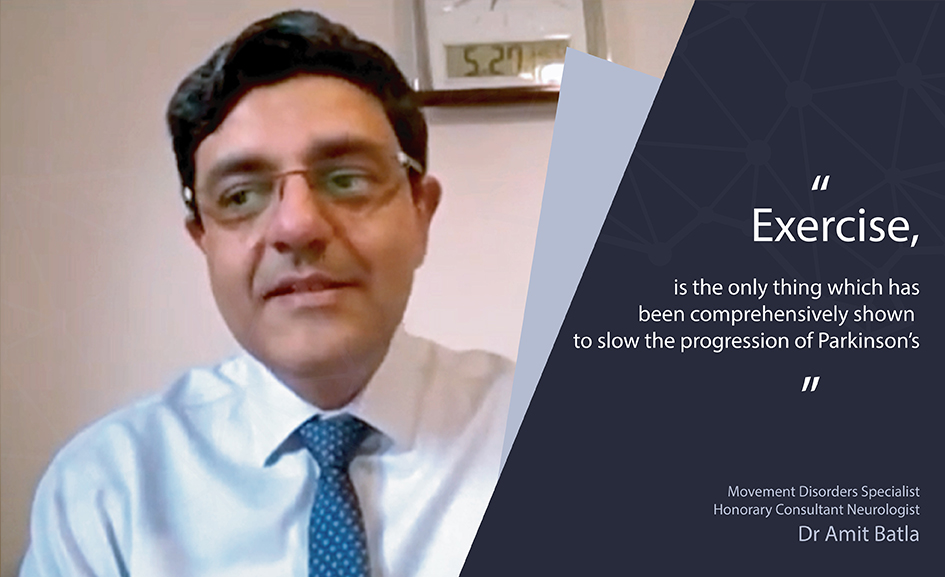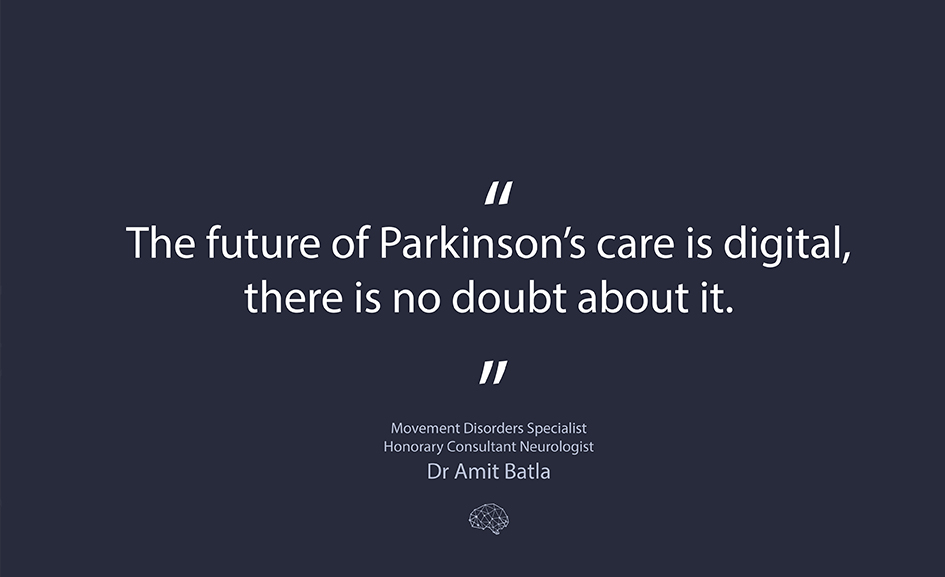Dr Amit Batla is a movement disorders specialist and Honorary Consultant Neurologist at National Hospital for Neurology and Neurosurgery, in London.We are very grateful that he was able to answer some questions from the Parkinson’s community, in a Q&A hosted by Parkinson’s Concierge.
Advice for Those Newly Diagnosed with Parkinson’s
A diagnosis of Parkinson’s may at first be concerning, but Dr Batla offers some practical advice. First, try to read and understand the condition. You can read the general information on both the Parkinson’s UK website and NHS Choices, and have a look at the page on the Parkinson’s UK website specifically for those newly diagnosed. Although speaking to a neurologist can be helpful, often the first call or visit with a Parkinson’s nurse specialist is the best opportunity you will have to get a grip on the new diagnosis.
Then, speak with your family and your employer. You don’t have to tell your employer, but Dr Batla says that personally, he thinks it’s best to discuss it with them, particularly if your organisation has a dedicated Occupational Health team. Additionally, although you can still drive if you have Parkinson’s, Dr Batla suggests you notify the DVLA that your health status has changed. If you live in England, Scotland or Wales, that can be done here. If you live in Northern Ireland it can be done here.
It’s important to remember that a diagnosis of Parkinson’s “is not all doom and gloom”; Parkinson’s is a treatable disorder. Nevertheless, you may not even need treatment when you are first diagnosed. “Just make sure you research the condition and be involved in the decisions about your care”. You can inform your choices better by knowing about the current scientific research into Parkinson’s and keeping an eye on future developments. This approach “enables the person with Parkinson’s to be in the driving seat”.
Understanding COVID-19 and Parkinson’s
Parkinson’s has not been classified as a high risk for becoming seriously ill with COVID-19, and it will not predispose people to catch the infection. However, the risk of having a more serious illness if you do catch the virus is increased in people with difficulty swallowing and those with increased chances of lung infection, for example if they have previously had pneumonia. Additionally, if people have limited mobility they are more likely to require care and support from other people, which can increase the chance of becoming infected.
Although a Parkinson’s diagnosis will not generally cause you to have a more serious reaction to the virus, Dr Batla points out that it is a disease which can lead to each of the conditions mentioned above. If you are concerned about the risk to yourself or someone you support, you should speak to your neurologist or Parkinson’s nurse. You can also contact Parkinson’s UK on their helpline, 0808 800 0303.
For further information, please see our previous blog post on COVID-19 and Parkinson’s.
The Importance of Exercise
Dr Batla is keen to stress the importance of exercise. There is no treatment which will slow the progression of Parkinson’s, only those which treat symptoms at their onset. Exercise, however, “is “the only thing which has been comprehensively shown to slow the progression of Parkinson’s”.
So, what exercise should you be doing? Dr Batla tells us that there’s evidence that cardio exercise is helpful but also evidence that simply light exercise can help. If you don’t fancy running marathons then even a 15 – 20 minute walk every day is beneficial, but if you do decide to take part, Dr Batla reminds us that it’s important to train properly and have a specialist supporting you.

“My advice is don’t burn yourself out; it’s not the case that only heavy exercise will contribute to slowing progression.” Remember that fatigue is often quite common in Parkinson’s and it is possible to crash after a period of heavy exercise. “I can’t quantify it and say how slow your Parkinson’s progression will be if you walk compared to running a marathon, but any exercise is good”.
A crucial point to remember is that apathy is also often a problem for people with Parkinson’s. It can be difficult to motivate yourself to exercise, which is why Dr Batla feels that dancing is brilliant; “anything that stimulates the brain and the body at the same time”.
“Whatever you do, be mindful, tailor it to yourself, and be consistent. If you want to slow down your Parkinson’s you have to continue the exercise all the way through, for several decades, not just a few weeks or months”. Parkinson’s UK have a page dedicated to exercises for slowing down symptom progression.
How to Overcome Freezing
Some people with Parkinson’s experience freezing; an inability to move for several seconds or minutes, which most commonly affects people when they are starting to walk or are already walking. For most people, the movement is automatic, but Parkinson’s causes an interruption in the flow of movement. Walking forwards consists of a series of individual movements; if one part of the sequence is interrupted the whole movement can come to a stop.
One method that Dr Batla suggests to overcome freezing is the use of an adaptive strategy called cueing. He tells us that cueing diverts the brain’s attention into making the movement in a different way. Visual cues can be used, such as a laser pointer on the end of a walking stick or identifying patterns on the floor. Alternatively, rhythms or vibrations can be used. Another technique is to break the movement down into its individual steps, for example by lifting your foot, then placing it onto a certain mark on the floor. Similarly, you can move on the beat of a rhythm or a metronome. Dr Batla also suggests setting a clear target for movement, for example the goal to move your foot on the count of three. He notes that you should concentrate on which foot you plan to move first.
Freezing can be made worse if you’re feeling anxious, but can also causes severe anxiety, particularly if you are in a crowded place. Dr Batla says that the important thing to do if you freeze is to try to stay calm until it passes; “It may feel like forever, but generally most freezing episodes only last a few seconds. Just stay there and try to be patient”. If you are concerned about being in people’s way, practise shifting your balance from left to right foot and then try to move sideways, as this is often easier than moving forwards.
Dr Batla tells us that sometimes if a person tries to break the freeze and moves before they are ready they may fall, as the upper body will bring their weight forwards without their feet moving. It is therefore important to ensure you have waited for the freezing to pass, or are using an adaptive strategy to break it, before attempting to move forwards. As Dr Batla says, “If you’re alone and stuck there, just don’t do anything. You’re not going to miss the bus; there will be another one. If you miss your train another one will come along too. It’s not the end of the world and it will pass. Calm down, take a deep breath, relax, take small steps and then start moving”.
Parkinson’s UK has lots of useful information on freezing and techniques to help with it.
The Future of Healthcare is Digital
When asked about video consultations and a more digital health service, Dr Batla says, “I’ve been doing telephone clinics for 2 years now, predominantly for people who couldn’t come in and I just needed to find out how they are and catch up”, but at first when video consultations started there was resistance from the NHS: how could you be sure you were making an accurate diagnosis?; what happens if you miss a diagnosis that you would have caught if you had seen them in person?

Dr Batla says that there are still lots of barriers to a completely digital health service, but COVID-19 has “pushed our limits and made us think differently”. He thinks the service needs to be carefully tailored and probably wouldn’t work well for a first diagnosis, but video consultations would mean check-ups could occur more often and could be aided by remote monitoring tools like a gadget to measure tremor, gait and bradykinesia, without people needing to go in to hospitals. “Yes, the future of Parkinson’s care is digital, there is no doubt about it”.
We are very grateful for Dr Batla and Parkinson’s Concierge for discussing these points raised by the Parkinson’s community.
Stay up-to-date with our progress and be the first to know when CUE1 is available and on sale! We’ll also send you an introductory offer as well as further information on our research progress and testing recruitment.